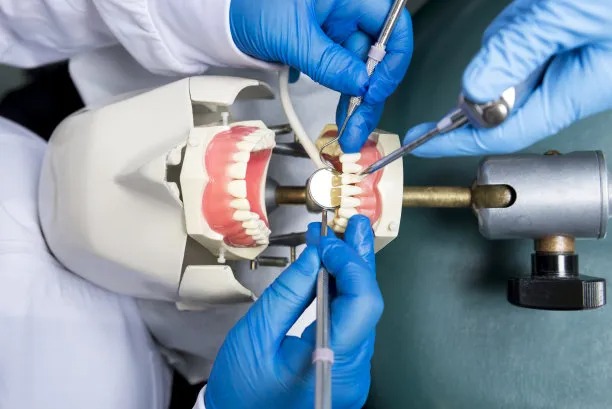Summary: Dental implantation procedures represent a significant advancement in restorative dentistry, providing patients with a long-lasting solution for missing teeth. This article outlines essential guidelines to ensure the safety and success of dental implantation, focusing on pre-operative preparations, surgical techniques, post-operative care, and patient follow-up protocols. By understanding these crucial aspects, patients can better equip themselves for the dental implant process and enhance their chances of a successful outcome. Lets delve into each of these guidelines to highlight their importance in achieving optimal results and establishing patient-centered care throughout the dental implant journey.
1. Importance of Pre-operative Evaluations

Before undergoing a dental implant procedure, a thorough pre-operative evaluation is vital for assessing a patients overall oral health and identifying any potential complications. This includes a comprehensive dental examination, full medical history review, and imaging techniques such as X-rays or CT scans to evaluate bone density and the spatial relationship of oral structures.
Additionally, patients may need to undergo specific tests to determine their suitability for implants, especially concerning underlying health conditions such as diabetes, heart disease, or any autoimmune diseases. Collaborating with healthcare professionals to manage these conditions can significantly reduce risks during the surgical procedure.
Moreover, pre-operative consultations provide patients with the opportunity to discuss their dental concerns, desired outcomes, and any anxieties surrounding the procedure. This open dialogue helps in establishing realistic expectations and fostering trust between the patient and the dental implant team.
2. Understanding Surgical Techniques and Protocols
The success of a dental implant procedure heavily depends on the surgical techniques employed. It is crucial for dental practitioners to follow evidence-based protocols to minimize risks and optimize outcomes. The choice of anesthesia, whether local or general, should be appropriately determined based on the complexity of the case and the patients comfort level.
During the actual implantation, the surgeon must adhere to strict aseptic conditions to prevent infections, a leading cause of implant failure. Utilizing advanced tools and technology, such as guided implant surgery or digital planning, can enhance precision and fit during the implantation process.
Furthermore, it’s important to take into account the quality and quantity of bone available at the implant site. Bone grafting might be necessary for patients with insufficient bone mass to support the implant. Understanding these surgical nuances helps in crafting a personalized approach that prioritizes patient safety and procedural success.
3. Ensuring Effective Post-operative Care
Post-operative care is a crucial determinant of the success of dental implants. Patients should be provided with clear instructions about what to expect after surgery, including pain management, swelling, and dietary restrictions. Following the prescribed care regimen can significantly contribute to a smoother healing process.
Patients are encouraged to schedule follow-up appointments to monitor the healing process and ensure that the implant integrates properly with the jawbone. Regular check-ups allow dentists to address any concerns early and adjust care plans as needed to prevent complications.
Additionally, maintenance of oral hygiene post-implant is essential. Patients should be guided on effective brushing and flossing techniques, as well as the use of antibacterial mouth rinses to protect the implant site from infections. Education on the importance of ongoing oral health will empower patients to take personal responsibility for their implants and promote longevity.
4. The Role of Patient Follow-up Protocols
After the dental implant procedure, establishing a follow-up protocol is critical for monitoring the success of the implant and addressing any potential issues that may arise. Regular follow-up visits allow the dental team to assess the implants stability, ensure proper oral hygiene practices, and provide additional support as needed.
Moreover, educating patients on the significance of reporting any discomfort or abnormal symptoms is essential. Early intervention can mitigate more serious complications and help maintain the integrity of the implant. Patients should understand that their active participation in this follow-up process is vital for their overall dental health.
Long-term follow-up care should also include periodic evaluations of the surrounding soft tissue to ensure it remains healthy and free from signs of infection. Continuous monitoring enhances the likelihood of implant longevity and ensures the dental restoration remains a successful part of the patients oral health journey.
Summary:
The guidelines presented in this article underline the importance of a comprehensive approach to dental implantation, from thorough pre-operative evaluations and refined surgical techniques to effective post-operative care and vigilant follow-up protocols. For patients, understanding these steps is integral to achieving a successful dental implant experience.
Its crucial to remember that a successful dental implant requires teamwork between the patient and dental professionals, with a solid emphasis on communication and education throughout the process.
This article is compiled by Vickong Dental and the content is for reference only.
Vickong Dental
Vickong Dental is a large medical group established in Hong Kong in 2008 by professors from well-known medical universities in Guangdong and Hong Kong, as well as medical doctors from key national '985' universities (including Master's supervisors and senior professors). The chain of branches brings together expert dentists with PhDs and Master's degrees from Hong Kong and Mainland China, committed to providing high-quality dental treatment.
"Vickong Dental Practices the University Motto of 'Healing and Serving Society,' with a Stable Operation for Sixteen Years. It Has Been honored with Hong Kong Enterprise Leaders's Choice,' and is a Global Trusted Implant Center for the Nobel Implant System. Recommended by Hong Kong Metro Broadcast and Guangdong Television, it Serves Customers from Over Thirty Countries and Regions, Gaining the Trust and Favor of Citizens from the Guangdong-Hong Kong-Macau Greater Bay Area and Surrounding Cities.

Thousands of customers' unanimous praise
The most recognized and highly recommended dental service by customers in the Guangdong-Hong Kong-Macau Greater Bay Area
We Ensure You Receive Detailed Care and Attention Here
Hong Kong standards, Shenzhen prices, Your Trusted English-speaking dentists

Vickong Dental Medical-Grade Instrument Disinfection Process
Vickong Dental Medical-Grade Instrument Disinfection Process

Vickong Dental Chain: A Warm and Comfortable Environment for Treatment






Appointment Hours

Q&A
Why choose Vickong Dental?
Vickong Dental practices the university motto 「Medicine to Benefit Society」, with each branch bringing together highly qualified dentists with doctoral and master’s degrees from Hong Kong and the Mainland, and has maintained seventeen years of steady operation。Recipient of 「2024 Hong Kong Enterprise Leaders Brand」, 「2025 Hong Kong Enterprise Leaders Brand」, a Nobel Biocare Global Trusted Implant Center, and a brand recommended by Metro Radio Hong Kong and Guangdong TV。
To date, we have served customers from more than thirty countries and regions,earning exceptionally high word-of-mouth recognition and trusted recommendations from residents across the Guangdong-Hong Kong-Macao Greater Bay Area and surrounding cities
We have eight major branches in Zhuhai、Shenzhen,and a consultation and service assurance center in Hong Kong,so you can book a free consultation at any time for any questions,which is very reassuring.
If I do not accept the quotation after the CT scan, will I be charged??
No! As long as the actual treatment has not started, you will not be charged any fees.
Will there be any additional charges during the treatment process?
No, there won’t be any additional charges. Before treatment begins, we will clearly explain the treatment plan and its corresponding fees. Only after the patient agrees and signs the consent form will we proceed with the dental service.
Can I pay in Hong Kong dollars?
Yes. Vickong Dental accepts payment in Hong Kong dollars. The amount will be converted based on the exchange rate of the day, and the applicable rate will be clearly communicated to you in advance.
Can I reschedule my appointment at any time?
Yes. Please contact us via **WeChat** or **WhatsApp** as early as possible, providing your original appointment time and details, along with your preferred new date and time slot for rescheduling.













